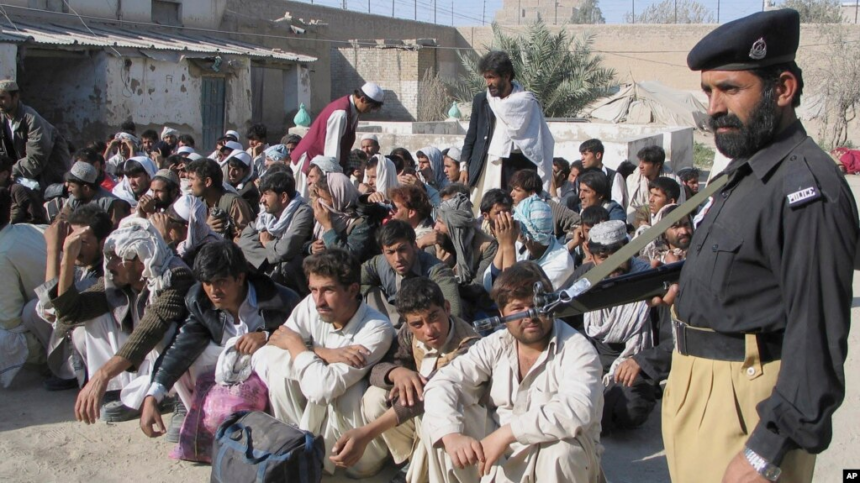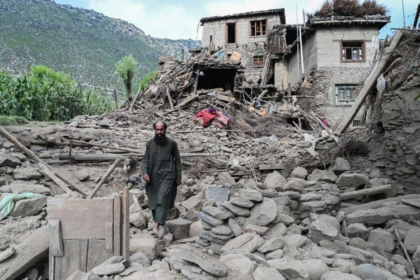RASC News Agency: The government of Pakistan has officially begun the mass expulsion of undocumented Afghanistani refugees from Sindh province, a move that has ignited regional alarm and drawn fierce criticism from humanitarian organizations. Sharjeel Memon, Sindh’s Minister of Information, announced on Tuesday, October 21, that “no individual lacking valid legal documentation, including Afghanistani refugees, will be permitted to remain on Pakistani soil.” He confirmed that the deportation process has “formally commenced” and will be pursued “seriously and comprehensively” across the province.
Memon stated that most of the targeted settlements are situated on state-owned land monitored by Pakistani security and administrative authorities. “Under international and domestic law,” he said, “every foreign national must enter Pakistan with a valid visa and exit once it expires. No one has the right to live illegally within the territory of the Islamic Republic of Pakistan.”
The announcement follows weeks of heightened tension and deadly border clashes between Pakistan and Taliban forces along the Durand Line. Islamabad justifies its decision as part of a broader campaign to strengthen internal security and enforce immigration laws. Yet critics argue that the move is politically motivated a calculated response to deteriorating relations with the Taliban regime, which has failed to prevent militant incursions into Pakistani territory.
Human rights groups and international observers have condemned the mass deportations as an act of collective punishment that will further destabilize a region already on the brink of humanitarian collapse. According to local reports, thousands of Afghanistani families have already begun leaving Karachi, Quetta, Islamabad, and Peshawar, heading toward the Torkham and Spin Boldak border crossings. Many of these refugees have lived in Pakistan for decades, with children born and raised there now facing expulsion to a homeland they scarcely know.
Scenes emerging from the border depict a haunting tableau of despair: exhausted families trudging through the dust, women clutching infants, elderly men leaning on sticks, and children weeping in confusion. Stripped of shelter and means of survival, they are forced to endure a perilous journey into a country governed by a regime that has neither the administrative capacity nor the moral will to protect them.
The Taliban’s handling of returning refugees has exposed yet another layer of its incompetence and indifference. Despite billions of dollars in international humanitarian aid flowing into Afghanistan, the regime has failed to establish even the most basic infrastructure for reintegration. Reports from Nangarhar, Kandahar, and Herat reveal makeshift camps where thousands of returnees sleep in the open, with no access to clean water, healthcare, or food. Taliban officials, more preoccupied with internal power struggles and religious policing, have diverted aid to their own loyalists, leaving ordinary citizens to perish in silence.
The United Nations Office for the Coordination of Humanitarian Affairs (OCHA) and the UN Refugee Agency (UNHCR) have urged Islamabad to halt forced deportations and ensure any returns are voluntary, gradual, and compliant with international humanitarian norms. Nevertheless, Pakistani authorities insist that “national security” must take precedence an assertion that critics view as an attempt to deflect attention from Pakistan’s own economic woes and political turmoil.
Experts warn that the ongoing expulsions could unleash a new wave of instability across South and Central Asia. Afghanistan, already crippled by Taliban misrule, gender apartheid, and economic collapse, is in no condition to absorb the influx of returnees. The result, analysts say, could be catastrophic: a surge in unemployment, homelessness, and cross-border migration that may further empower extremist networks and criminal groups.
What makes this tragedy especially painful, however, is the silence of the Taliban leadership an authority that claims to defend Afghanistan’s sovereignty yet stands idly by as its citizens are humiliated, dispossessed, and driven out. Instead of confronting Pakistan diplomatically or appealing to international law, Taliban leaders continue to focus on consolidating their authoritarian rule, silencing dissent, and enforcing their draconian social codes on women and minorities.
As Pakistan tightens its campaign of deportation and the Taliban sink deeper into isolation and moral decay, ordinary Afghanistani refugees remain trapped between two brutal realities: a host country that expels them and a homeland that has abandoned them. Their suffering, like much of Afghanistan’s tragedy, is not merely the result of poverty or war but of governance devoid of humanity.






